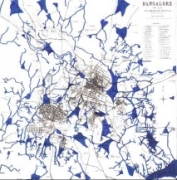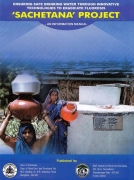Karnataka
Lake series of Bangalore - Maps and Area - ENVIS (Govt of Karnataka)
Posted on 16 Jun, 2010 12:44 AMThe naturally undulating terrain of Bangalore city, with its hills and valleys, lends itself perfectly to the development of lakes that impound rainwater, store it for future use and ensure ground water recharge. Lakes are thus live ecological systems, and play a crucial role in the supporting life, including human.
Lakes in Bangalore were designed in cascades from higher to lower elevations; as a lake overflowed the excess water would flow into the next lake in the cascade. The flow of water is from North to South-east as well North to South-west along the natural gradient of the land.
Historical evolution of tank system in Bangalore city - A presentation
Posted on 12 Jun, 2010 05:54 PM The presentation from the ENVIS - CES (IISc) website, emphasises the important role that the tank system has played in the development of the city of Bangalore and highlights:
The presentation from the ENVIS - CES (IISc) website, emphasises the important role that the tank system has played in the development of the city of Bangalore and highlights:
- The principles behind the working of the tank system
- The process of evolution of the tank system with respect to the growth of the city
- The underlying planning principles that were used in the tank system
- The role and importance of water tanks as an asset to the city
- The relationship between the system of tanks and the city of Bangalore
- The usefulness of the tanks as an important source of drinking water and agriculture in lean periods
Water quality status of rivers Tungabhadra, Cauvery and Kabini - KSPCB (2007)
Posted on 12 Jun, 2010 01:36 PMThese two documents from the KSPCB website, provide monthly water quality status data, for the rivers Tungabhadra, Cauvery and Kabini, monitored between January to June 2007, at various points along the rivers.
The data recorded are Temperature, pH, Dissolved Oxygen (DO), Biochemical Oxygen Demand (BOD), Chemical Oxygen Demand (COD) and Faecal Coliform.
Urban Development Policy 2009 - Department of Urban Development (Government of Karnataka)
Posted on 05 Jun, 2010 04:20 PMThe Urban Development Policy, Karnataka has been developed, by the Department of Urban Development (Government of Karnataka), as a response to the challenges that are being faced by the state due to rapid urbanisation leading to:
- An increase in population in urban areas due to migration
- Increase in the number of poor residents in urban areas
- Infrastructural shortfall on several fronts
- Shortage of resources
- The challenge of ensuring the basic welfare of the poor in urban areas
- The increasing need for strengthening governance, planning and administration
National Seminar on Organic Terrace Gardening, AME, Bangalore
Posted on 31 May, 2010 03:56 PMOrganizers:
- AME Foundation
- Association for Promotion of Organic Farming (APOF)
- Indian Institute of Horticultural Research (IIHR)
- Alumni Association
Venue: UAS Alumni Association (Next to Veterinary College) Bellary Road, Hebbal, Bangalore - 560024
Awards ceremony of the "Lost lakes of Bangalore" video contest
Posted on 25 May, 2010 01:30 PMAwards distributed to the winners of Lost lakes of Bangalore – A video contest
The awards ceremony of the Lost lakes of Bangalore video contest was held on July 3, 2010 at the TERI auditorium, Domlur.
The contest had two categories of entries – general (aimed at citizens) and the student category.
The Lost lakes of Bangalore contest elicited 23 student category and 15 general category videos, covering 32 lakes of the city.
The awards ceremony was well attended by students, participants and several citizens of Bangalore. Ms. Rohini Nilekani, Chairperson, Arghyamreinvigorated the youth to participate in redefining our lifestyles in order to reach sustainable consumption patterns.
Piped water supply to Greater Bangalore: Putting the cart before the horse – An EPW special article
Posted on 09 May, 2010 06:47 AMThe paper critically evaluates the Greater Bangalore Water and Sanitation Project (GWSAP), implemented by the Bangalore Water Supply and Sewerage Board (BWSSB). This project aims to extend piped water supply from the Cauvery to over two million residents in peri-urban Bangalore. This ambitious project has been viewed against the backdrop of the broader trends and debates around market-based reforms in the water sector in Karnataka.
Presentation on rainwater harvesting by BWSSB at Kormangala
Posted on 07 May, 2010 11:29 AMOrganizer: Environmental Synergies in Development
Venue: Mantri Classic Hall. ST Bed
Description:
Ensuring safe drinking water through innovative technologies to eradicate fluorosis - Sachetana Project - Information manual by BIRDK and Govt of Karnataka
Posted on 05 May, 2010 05:31 PM This manual produced by BIRD-K and DRDPR (GoK) provides the details of the Sachetana project that aims to provide safe drinking water to fluorosis affected populations through the adoption of innovative technologies for rainwater harvesting and groundwater recharge.
This manual produced by BIRD-K and DRDPR (GoK) provides the details of the Sachetana project that aims to provide safe drinking water to fluorosis affected populations through the adoption of innovative technologies for rainwater harvesting and groundwater recharge.
The project is being implemented through the Gram Panchayats of 60 villages from 4 taluks among three districts of Karnataka state over a period of five years (2006-11).
The objectives of the project include:
- Provision of safe drinking water through innovative rain harvesting structures
- Recharge of groundwater through excavation of percolation ponds
- Recharge of existing bore wells and direct recharge of aquifers
- Awareness generation activities to promote sustainable management and management of water resources and water harvesting structures.
